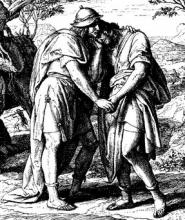Last week we went over the story of young David's battle with the Philistine champion Goliath. While this display of prowess was impressive, the social intrigue that happens in the wake of the contest is arguably more important and more meaningful. At this point in First Samuel (chapter 18 specifically) the story becomes considerably more dense. Many events take place in the space of a single chapter and it's easy to miss a number of the many important details along the way. One element that has been a source of much debate and distraction over the ages is the relationship between David and Jonathan, Saul's son and the heir apparent to the throne of the two kingdoms.
First Samuel spends an unusual amount of time describing the bond between David and Jonathan. More to the point, the text uses rather intense, poetic language to impress the degree to which the two young men were bonded. After David slays Goliath, Saul invites David to live in his home where he quickly takes up a favored position in the royal family. In this new living situation, David ends up spending a lot of time with Jonathan and the two develop a loving relationship as a result.
This is where the interpretations get muddled. Since the middle ages, scholars have debated the likelihood of David and Jonathan having a romantic relationship in addition to their friendship. The two are described as having a bond (using the Hebrew word Niq'shirah which shares a root with the term b'sheret meaning "soul mates" or more literally "in a link as if by a chain") and the text even uses words derived from the general Hebrew term for "love", even though that term doesn't exactly connote romantic love. David and Jonathan even form a covenant between them.
I will not argue for one side or the other concerning the possibility of a romance between David and Jonathan, not because I don't wish to choose a rhetorical position but because I don't believe the nature of their relationship is relevant. Whether romantic or not, the text is clear about one thing: Jonathan makes himself subservient to David. The purpose of these passages isn't to describe the nuances of David's social life, but to depict just how deeply his presence in Saul's court changed the political atmosphere of the kingdom.
At this point in the story, David is everybody's favorite person. From the highest royals to the common people, David is a champion and everyone favors him over Saul. The people even begin to circulate a phrase, "Saul has slain his thousands, and David his ten-thousands." In a time dominated by war, it's obvious that David is seen as being a more capable leader. So, when Jonathan shows his love to David, it's his willingness to show fealty and loyalty that's important.
With the entire nation supporting him, David becomes a source of fear for Saul. The king does everything he can to destroy David, but everything that happens just makes him stronger. By the end of the chapter, David has claimed both Saul's son Jonathan and his second daughter Michal (or Michelle) as his greatest ally and his wife, respectively. These passages are the story of David's unprecedented rise to fame and the relative innocence with which he navigates Saul's attempts to hurt him. David isn't a Machiavellian prince, he's just blessed.
